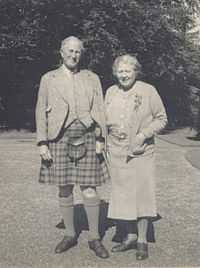James Graham, 6th Duke of Montrose
| His Grace The Duke of Montrose KT, CB, CVO, VD | |
|---|---|
 | |
| The Duke and Duchess of Montrose in the 1940s. | |
| Personal details | |
| Born | James Graham 1 May 1878 London, England, UK |
| Died | 20 January 1954 (aged 75) Buchanan Castle, Scotland |
| Resting place | Buchanan, Stirlingshire, Scotland, UK |
| Nationality | Scottish |
| Occupation | Politician |
| Profession | Engineer |
James Graham, 6th Duke of Montrose KT CB CVO VD (1 May 1878 – 20 January 1954), was a Scottish nobleman, politician and engineer.
The eldest son of Douglas Graham, 5th Duke of Montrose, he was educated at Eton College. In 1906 he married Lady Mary Douglas-Hamilton, the only child of the 12th Duke of Hamilton. They had four children, James Graham, 7th Duke of Montrose, Lady Mary Graham, Lord Ronald Graham and Lady Jean Graham.
He served in the Mercantile Marine and ASC in South Africa (medal and 3 clasps), 1900, as well as the Auxiliary Naval Service during World War I 1914–1919 (two medals). He was later Commodore of the Clyde Division of the Royal Naval Volunteer Reserve and of East Coast of Scotland RNVR, then Commodore of the RNVR from 1921, retiring in 1927. He was unpaid Assistant Private Secretary to the Chancellor of the Exchequer in 1905, and Naval Aide-de-Camp to His Majesty.
He was unsuccessful as the Conservative parliamentary candidate for Stirlingshire in 1906, at the 1906 by-election at Eye, Suffolk, and at the general election in 1910. He joined the Liberal Party in 1936.
He was President of the British Institution of Marine Engineers in 1911, and President of the Junior Institution of Engineers in 1916 and 1917. He was the inventor and designer of first naval aircraft carrying ship, and designer and owner of the first seagoing heavy oil motorship. He obtained the first film ever taken of a total eclipse of the Sun during a Royal Astronomical Society expedition to India in 1899, and took part in a mission in 1900 for Lloyd's of London to the South African Government to establish wireless telegraphic stations on the coast. He was Vice-President of the Institution of Naval Architects, a Younger Brother of Trinity House, a Trustee for the Royal Incorporation of Master Mariners, a Member of the Royal Company of Archers, and Commodore of the Sea Cadets in Scotland. In 1935 he became the second President on the National Institute for the Deaf, a post he held until his death.
Honours
He was Lord Lieutenant of Buteshire from 1920 until 1953 and was Lord High Commissioner to the General Assembly of the Church of Scotland in 1942 and 1943. He was appointed a Commander of the Royal Victorian Order in 1905, a Companion of the Bath in 1911 and a Knight of the Thistle in 1947.
References
- Fry, Michael (May 2006). "Graham, James, sixth duke of Montrose (1878–1954)". Oxford Dictionary of National Biography. Oxford University Press. doi:10.1093/ref:odnb/72367. Retrieved 30 May 2009. (subscription or UK public library membership required)
- "The President passes", Silent World, 1954, 8(9), pp. 272–75
- My Ditty Box, The Duke of Montrose. Jonathan Cape, London, 1952
| Honorary titles | ||
|---|---|---|
| Preceded by The Marquess of Bute |
Lord Lieutenant of Buteshire 1920–1953 |
Succeeded by Lord Colum Crichton-Stuart |
| Peerage of Scotland | ||
| Preceded by Douglas Graham |
Duke of Montrose 1925–1954 |
Succeeded by James Angus Graham |
|